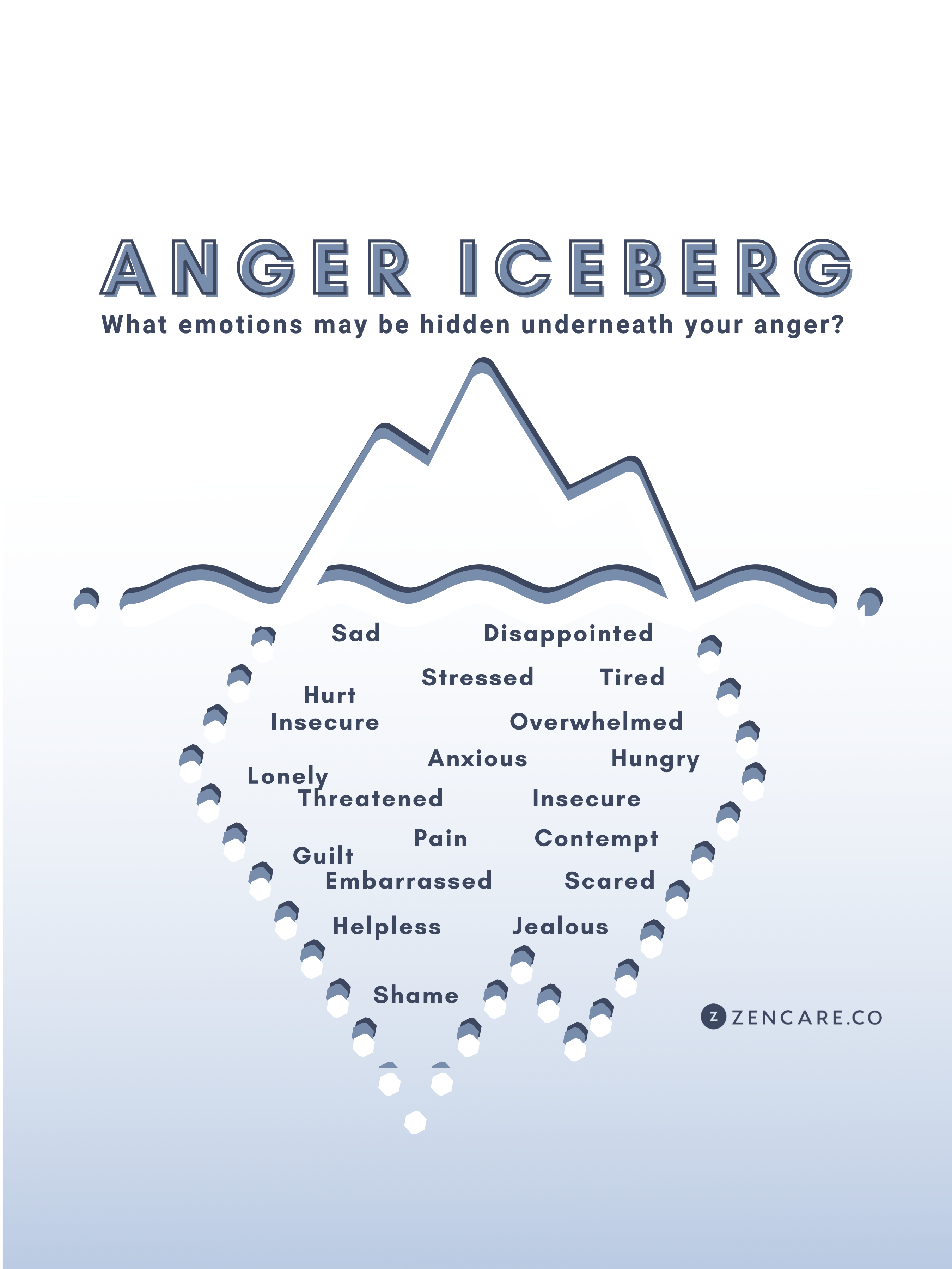It happens just like it did to the infamous Titanic. You’re going through your day, life as usual, feeling just fine. You notice something, a feeling, a little sensation in the back of your mind.
Then something happens – it could be something you see, an action someone else takes, or a thought that pops into your mind – and suddenly, you’re so angry that you want to scream. You just hit the Anger Iceberg.

What is the anger iceberg?
The Anger Iceberg is a concept created by the Gottman Institute that describes anger like an iceberg: Above the sea, we can see the visible "tip" of the anger. We see and hear yelling, stomping feet, and raised voices.
Yet we don’t see what’s beneath the surface: The other emotions in the mix, like frustration, hopelessness, disappointment, pain, jealousy, loneliness, or fear.
It’s generally easy to spot anger. The anger iceberg helps us figure out what else is going on. It gives attention to the underlying feelings bubbling beneath the obvious manifestations in behavior.
In paying attention to the other emotions involved in an anger reaction, we can better understand why we’re so mad and find ways to dissipate this anger in a productive, meaningful way. We can also learn more about ourselves as emotional creatures, including how we currently cope, and how we can work towards healthier styles in the future.
When is using the anger iceberg helpful?
Because anger is such a blinding emotion, using the Anger Iceberg can be very effective any time we need to remember that our reactions aren't one-dimensional.
Here are some examples of ways that the anger iceberg can be helpful:
When frustrated at work
When hearing criticism on a project you worked very hard on, making a hurtful comment to your teammate masks the disappointment you feel in hearing non-positive feedback on something in which you felt particularly invested.
When arguing in a relationship
Yelling at your partner when they do something wrong makes it too loud to hear how you too can be a better partner.
It makes the conversation one-sided, which limits how much you hear – that way, you won’t have to feel scared that your partner will touch on some of your more significant vulnerabilities within the dialogue.
When upset with your family
Punishing your parent by not answering calls because of something previously said may be your way of coping with familial stressors. If you don’t answer, you won’t have to talk through the issue or forgive your parent.
This is especially true if you have a latent resentment towards your family for one thing or another, perhaps a time they weren’t there for you when you needed them.
When you're mad at yourself
Perhaps the most complicated of ways to be mad, feeling anger at yourself almost always indicates that there is something deeper.
Maybe some previous injury, some emotional pain that you carry around with yourself, gets hit upon. Maybe you’re scared of something. Chances are, there are below-the-surface pieces to your anger.
How to use the anger iceberg to examine your anger
The next time you feel angry, really take a deep look into what else you feel besides anger.
Self-awareness may be difficult in times of anger, since feeling mad often cuts off the parts of our mind that are rational or logical. Slowing your thoughts down and examining each one may be very productive in helping you find better ways to cope with the feeling of anger.
When you’re angry, ask yourself these questions to gain a better understanding of your anger iceberg:
- How am I acting right now? How does my current display of anger mask another emotion that I feel?
- If I were a friend or someone else and in this situation, what might I also be feeling?
- Have there been times in the past where I felt angry in a situation, but later realized I was feeling something else?
Look for patterns or themes. Examining your responses may lead you to understanding the underwater parts of your anger iceberg.
Even taking the time to ask yourself introspective questions is a great first step in working on your anger and exploring your implicit emotions - emotions that might not be fiery like anger, but are nonetheless important to your overall mental well-being.
Consider seeking support from a therapist
Thinking through your anger iceberg may be difficult. After all, feelings like disappointment or resentment are incredibly difficult to unpack. Having a therapist may be beneficial in guiding you through the process.
Therapists often ask us to slow things down, and examine the connections between feelings and emotions to life events, stressors, memories. This can help treat the root cause of anger by giving us a chance to expose and work through emotions that are beneath the surface.
Cognitive Behavioral Therapy (CBT) is a great resource for people wanting to understand their emotions, and the behaviors that ride along with these emotions, in a skill-based method that focuses on thoughts and thought patterns.
Mindfulness practices, including the therapy type Mindfulness-Based Stress Reduction (MSBR), help slow thoughts and feelings down to help unpack and observe one’s emotional state in the moment, as well as offer diverse relaxation techniques. These are just two types of therapy that might be helpful at understanding your anger iceberg; there are plenty more to explore.
Understanding your anger iceberg is important in that it shows you what’s under the surface. It increases self-awareness in a way productive to knowing more about your anger. From there, finding ways to cope that touch more of your emotions than just anger will turn your anger from an iceberg to instead a mountain that you can climb.
